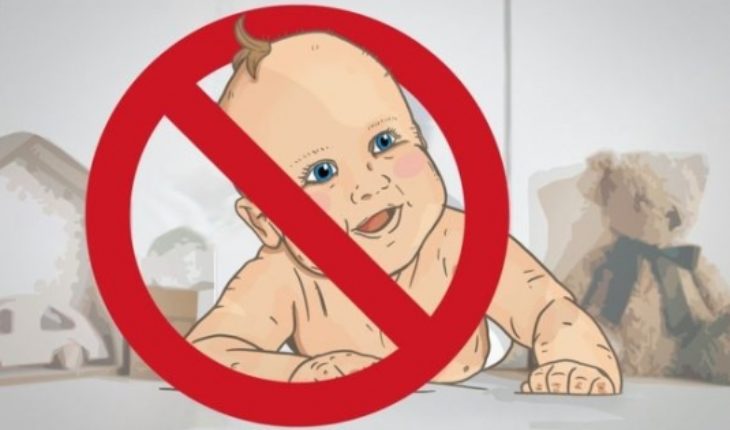“Wouldn’t it be better to dynamite the Earth and end it all?”
Thomas, 29, lives in eastern England and although his idea of blowing up the world is something of a mental experiment, he is sure of one thing: humans should not reproduce and our species should gradually become extinct.
This is a philosophy called anti-natalism.
Although the idea goes back to ancient Greece, social media has given it a big boost recently.
On Facebook and Reddit, there are dozens of anti-natalist groups, some with thousands of members.
On Reddit, the r/antinatalism channel has nearly 35,000 members, while only one of the dozens of anti-natalist-themed Facebook groups has more than 6,000.
They are scattered around the world and their beliefs are based on a variety of reasons.
These include concerns about genetic inheritance, not wanting children to suffer, the concept of consent, and concerns about overpopulation and the environment.
The world has 7.6 billion inhabitants, and by 2050 it is expected to be 9,800.What binds them is the desire to stop human procreation.
And while they are a marginal movement, some of their views, particularly on the state of the Earth, appear increasingly in the debate in general.
Although not declared anti-natalist, the Duke of Sussex, Prince Henry of England, recently said that he and his wife planned to have a maximum of two children, due to environmental concerns.
Philosophical chat
Thomas hadn’t heard of antinatalism before anyone used the term in a YouTube comment thread a few years ago.
Since then, he has become an active member of an anti-Natalist facebook group.
It provides you with intellectual stimulation and a place to test your discussion skills.
“I think it’s unbelievable. You’re talking about real-life problems,” he says.
“There’s a lot of discussion, some of that becomes quite delicate.”
But his passion for anti-natalism is not just theoretical.
Thomas believes that human life has no purpose.
Environmental issues are one of the concerns of anti-natalists. In fact, he has tried, albeit unsuccessfully, to have a vasectomy performed on him by the UK’s National Health Service (NHS).
NHS doctors may refuse sterilization operations if they believe the procedure is not in the best interests of the patient.
Non-violence and consent
Despite nihilistic rhetoric in anti-natalist groups, there is no indication that they are a violent threat.
When they talk about extinction, they often do so as an exercise in debate.
No one threatens murder or violence.
Thomas’s idea of blowing up the Earth goes through a big imaginary red button that, when pressed, would end human life.
He says he’d “press it immediately.”
But this idea is really very controversial for one of the principles of anti-natalism: consent.
Simply put, it is the idea that creating or destroying life requires the consent of the person who will be born or die.
Thomas says if there was a button to end humanity, He would “press immediately.” Kirk lives in San Antonio, Texas.
He remembers a conversation with his mother when he was just four years old. That’s when she told him that having children was optional.
“This doesn’t make any sense to me, to voluntarily put someone in this world to suffer and die,” he says.
Kirk says that even at that young age, he became an anti-natalist.
He opposes the creation of human life because none of us were explicitly asked if we wanted to be here.
“If everyone consented to play the game of life, I would have no objection,” he admits. “It’s all about consent or lack of consent.”
The concept also works in reverse.
The problem with that big red button that extinguishes humanity is that many people enjoy life, and not everyone would consent to it all ending.
The philosopher David Benatar believes that human beings experience too much suffering throughout their lives. Instead, Kirk and most anti-natalists want people to volunteer to stop bringing children into the world.
There is a different theme that is also common in anti-natalist groups.
Mental health problems
Social media posts often share mental health experiences, and from time to time anti-birth groups condemn those with mental health problems for having children.
One post included a screenshot of a post by another user that said, “I have a borderline personality disorder, as well as generalized anxiety and bipolarness.”
The anti-natalists added their own commentary: “This individual has two children. I feel bad for the kids.”
“I’ve had schizophrenia and depression,” Thomas explains.
“Depression is also present in my family. I think if I have kids there’s a good chance they’ll fall into depression and not like their lives.”
But it also says that the community is often mislabeled by outsiders.
“People start labeling us like crazy psychopaths,” he says.
“The truth is much more complex.”
The German philosopher Artur Schopenhauer was one of the leading Western thinkers in questioning the value of existence.
Anti-natalist arguments have been fuelled in recent years by the growing focus on the environment and the potentially devastating effects of climate change.
Judging by publications in anti-natalist groups, there is clearly a great overlap between their ideas and environmental activism.
“I feel like it’s selfish to have children right now,” says Nancy, a yoga instructor from the Philippines, who is vegan and advocates living without plastics, defending animal rights.
“The reality is that children who are born create more destruction of the environment.”
A Facebook group called “very angry anti-natalists” has shared a petition they hope to send to the United Nations.
Its title is “Overpopulation as the source of climate catastrophe: stopping births in the world now.”
So far it has 27,000 signatures.
Anti-natalists consider it selfish to unilaterally make the decision to bring someone into this world. The idea of abstaining from having children to benefit the environment is not new.
In Britain, a charity called Population Matters has proposed this for years, although they are not anti-natalists.
In fact, their arguments are more in favor of the sustainability of the human race than for complete extinction.
“Our goal is to achieve harmony between the human race and the planet we are lucky enough to inhabit,” says Robin Maynard, the group’s director.
“If we have fewer children around the world and smaller families, we can achieve a much more sustainable population.”
But will the increase in population lead directly to an environmental disaster? According to the BBC Global Population correspondent Stephanie Hegarty, it’s hard to say, because the future cannot be predicted.
“As a result of economic development and falling fertility rates, the world’s population will stabilize at about 11 billion people in 80 years,” she says. “Whether this is a sustainable figure for the planet or not, we don’t know.”
“There are so many factors that are going to change over the next decade and the next century that we can’t predict that right now.”
The population of Latin America and the Caribbean will peak just below 768 million around 2058.Insults and criticisms
Among the intense philosophical and ethical debates about anti-natalist groups is a darker and less uplifting underground current.
Some routinely insult parents. Other insults are aimed at children.
“Pregnant women disgust me,” wrote one user.
But that doesn’t mean all anti-natalists hate children.
“I would say I personally like children and it’s precisely because I like them that I don’t want them to suffer,” Nancy says.
“Maybe bringing them into the world would give me some pleasure, but the potential threat is so great that I’m not sure it’s worth it.”
Uncontrolled population growth could jeopardize efforts to save the planet. But that’s not the only criticism. In some anti-natalist groups, users allude to the idea that babies should not be born in war zones, if there is a high probability of disability, or even among low-income parents.
Sometimes rhetoric sounds like a selective calf, or eugenics.
The anti-natalists the BBC spoke to had mixed feelings.
“What are the reasons for having a child?” Thomas replies when asked if he is concerned that children will be born in war-torn areas.
“In a country like this, there is less hope that things are going to change.”
It has a more relaxed position on children born in low-income households.
“Obviously I’m against having children, but I think you can be happy and live in a low-income area.”
So, is there a philosophy of general anti-natalist life?
“Do your best,” Kirk says. “Be kind, and don’t procreate.”
translated from Spanish: Anti-natalists: people who want you not to have children
August 14, 2019 |





